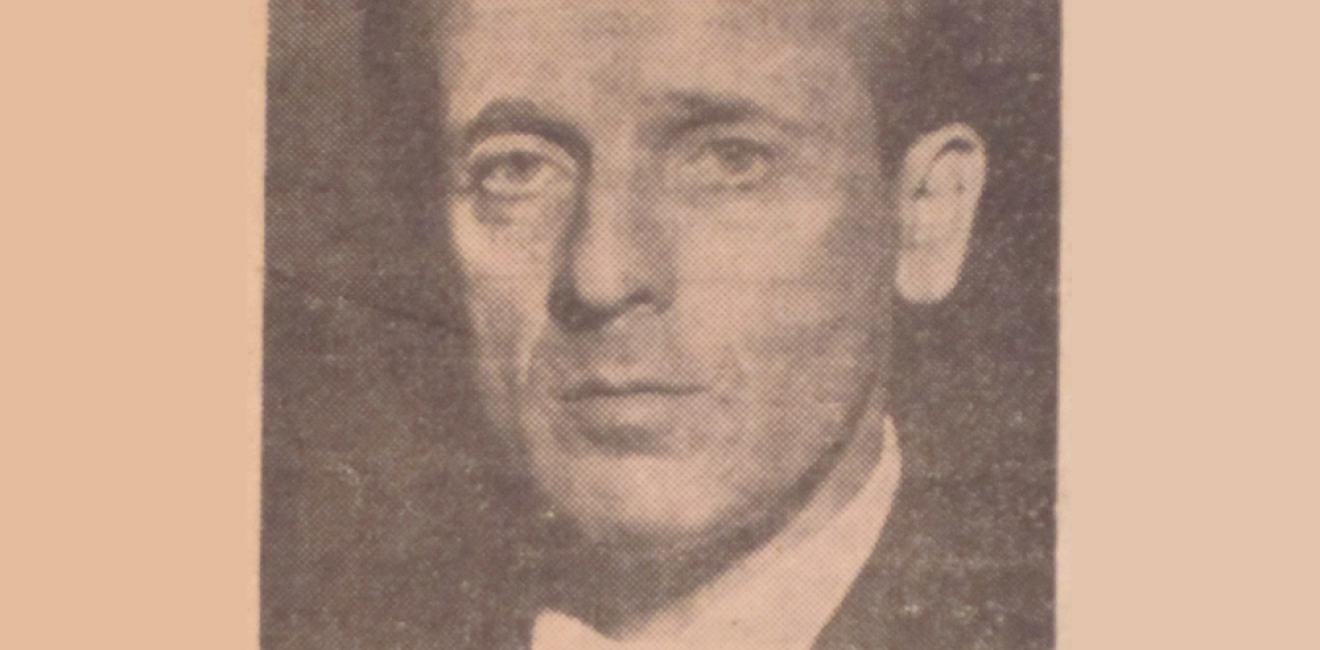In September 1951, Soviet Bloc security began rolling up an extensive US espionage ring in East Germany. Eventually, about 200 individuals were caught in the Soviet-East German dragnet. The Soviets sentenced many of them to lengthy prison terms and executed up to 46 in Moscow.[1] This American intelligence disaster came to be known as the “Walter Affair,” after the cover name of one of the captured informants. Thanks to recently discovered records in American and German archives, the story behind this deadly affair can now be told.
In April 1952, the Army’s premier espionage organization in Berlin, the 7880 Military Intelligence Detachment, dismissed one of its employees, Michael R. Rothkrug. The son of a German-Jewish father, Rothkrug had immigrated to the United States with his family when the Nazis came to power. He became an American citizen, served in the Army during the war, and in 1947 joined the Army’s intelligence organization in Berlin. Thanks to his fluency in German, Rothkrug found himself at the nerve center of US intelligence in the city. He managed the detachment’s document section, forged papers for American spies, and debriefed operatives in a safe house.[2]
Despite the breadth of his responsibilities, Rothkrug rubbed many of his coworkers the wrong way. One described him as “absent-minded, indecisive, and not officer material.”[3] The detachment’s commander, Col. Earle L. Lerette, recounted that Rothkrug literally brought his personal problems to work: one time, he arrived at the office “badly scratched, badly beaten up and highly nervous.” By way of explanation, Rothkrug offered that his girlfriend “was working him over at home.” Sometimes, his better half would show up in person and in front of Lerette accuse Rothkrug of failing to support her although she was pregnant. “The whole thing was just a nuisance,” Lerette stated.[4]
But Rothkrug’s turbulent personal life was the least of Lerette’s problems. The Army’s Counter Intelligence Corps began investigating Rothkrug after receiving a tip that he was stashing classified documents at home. Sure enough, the Corps’ lead investigator, Special Agent Eugene J. Kolb, discovered hundreds of secret documents in Rothkrug’s possession. Many identified by name American operatives in East Germany. The CIC also learnt that Rothkrug had the princely sum of $250,000 (the equivalent of $2.5 million in 2020) in his American bank account, and the Army’s investigators found no plausible explanation for the money’s provenance.[5] Most damningly, Kolb discovered that Rothkrug had been in touch with a known Soviet intelligence operative and had travelled to East Berlin without informing his superiors.[6]
The CIC investigation prompted Colonel Lerette to fire Rothkrug, and it induced the American high commission in Germany to try him for the unauthorized possession of classified documents. During the proceedings, Rothkrug portrayed himself as a well-intentioned if bumbling employee. By contrast, the prosecution’s chief witness, Special Agent Kolb, insinuated that the defendant had sold secret information to the Soviets. “I will personally see to it that you get thirty years in [the Army’s disciplinary barracks at Ft.] Leavenworth for doing this,” Kolb allegedly said to Rothkrug.[7]
Rather than press espionage charges, which would have involved a lengthy trial with an uncertain outcome, the prosecution opted for Rothkrug’s expeditious removal from Berlin. In August 1953, the court sentenced him to 11 months in prison for the possession of classified documents, but it suspended the sentence on the condition that Rothkrug leave Berlin immediately. As the presiding judge explained, the defendant “has in his mind a great deal of secret information which should not be conveyed to agents of a hostile power.”[8] Rothkrug jumped at the opportunity to extricate himself from his personal and professional quagmire in Berlin, returned to the United States, and faded from history.
If the Americans accomplished their short-term goal of eliminating a major security risk, the trial left the question of Rothkrug’s responsibility for the “Walter Affair” unresolved. Seventy years later, a dossier from the East German intelligence service (“Stasi”) provides the answer. This record references the recruitment attempt by a Soviet agent, Leo Blidin, of an “employee of the American secret service named Rothkrug” in May 1951.[9] The document does not elaborate further, but the recruitment would have occurred barely three months before the “Walter Affair.” Since Rothkrug had stolen numerous files identifying US informants in East Germany, he would have been in an ideal position to betray them to Blidin. In fact, Rothkrug knew some of the captured informants personally: “Fred Walter,” whose real name was Hanfried Hiecke, identified Rothkrug as his primary US contact.[10] Kolb did not name the “Soviet agent” known to Rothkrug, but the East German document points to Blidin. There can be little doubt that the Rothkrug-Blidin combination set in motion the bloody “Walter Affair.”
Rothkrug may have escaped justice, but his case opens a rare window into the secret world of espionage in early Cold War Berlin. Located well behind the Iron Curtain, the divided city served US intelligence as a springboard into the Soviet bloc. Unfortunately for the Americans, Berlin offered Soviet and East German spy catchers equally good opportunities to thwart their Western adversaries.
For their comments on this article, I am grateful to Dr. Julie I. Prieto, Dr. Enrico Heitzer, Dr. Brian F. Neumann, and Dr. Nicholas J. Schlosser.
[1] Enrico Heitzer, “Affäre Walter:” Die vergessene Verhaftungswelle (Berlin: Metropol Verlag, 2009), p. 11.
[2] Translation, Psychiatric Opinion of the Mental Condition of Mr. Michael Rothkrug, 7 Apr 1953, folder “1st [day of trial],” OMGUS/HICOG Criminal Court Case Files Held at Berlin, 1945-1955, RG 466, National Archives, College Park, Md.
[3] Testimony by Col. Jack W. Votion, 13 Apr 1953, folder “blank,” OMGUS/HICOG Criminal Court Case Files Held at Berlin, 1945-1955, RG 466, NACP.
[4] Testimony by Col. Earle L. Lerette, 5 May 1953, folder “13th Session,” OMGUS/HICOG Criminal Court Case Files Held at Berlin, 1945-1955, RG 466, NACP.
[5] Interrogation on 21 August 1952 of Michael R. Rothkrug, US civilian, while detained at 759th Military Police Battalion, McNair Barracks, Berlin, Germany, by Captain Kolb, 66th CIC Detachment, Region VIII, folder “1st [day of trial],” OMGUS/HICOG Criminal Court Case Files Held at Berlin, 1945-1955, RG 466, NACP.
[6] Testimony by Major Eugene J. Kolb, 19 Feb 1953, folder “Fifth Session,” OMGUS/HICOG Criminal Court Case Files Held at Berlin, 1945-1955, RG 466, NACP.
[7] Interrogation of Michael R. Rothkrug, 8 Jan 1953, folder “1st [day of trial],” OMGUS/HICOG Criminal Court Case Files Held at Berlin, 1945-1955, RG 466, NACP.
[8] Msg, DeWitt White, Chief Presiding Judge, to Mr. Edward Markowski, US Probation and Parole Officer, District of Connecticut, 22 Sep 1953, folder “Rothkrug, Michael R. 52-A2-347,” OMGUS/HICOG Criminal Court Case Files Held at Berlin, 1945-1955, RG 466, NACP.
[9] Auskunftsbericht, betr.: Blidin, Leo, geb. 1902 in Moskau [Report, sub: Blidin, Leo, born 1902 in Moscow], 10 Jun 1961, MfS – HA II Nr. 41402, p. 145, The Archive of the Federal Commissioner for the Records of the State Security Service of the former German Democratic Republic (BStU), Berlin, Germany.
[10] “Deckname Walter: Enthüllungen eines ehemaligen Agenten,” [cover name Walter: revelations of a former agent,] Neues Deutschland, 25 Feb 1953. Hiecke used a variety of cover names, including “Fred Walter,” “Alfred Fryling,” and “Stefan Shuettoff.” After his arrest, he cooperated with the Soviet authorities in exchange for a lighter sentence. He settled in East Berlin where he still lives today. Dr. Enrico Heitzer kindly shared this information on Hiecke’s biography with me.







